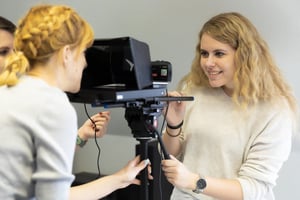Questions can be a huge source of concern for presenters. What happens if you don't know the...
Presentations can be scary.
And one of the parts that frightens people the most is answering questions from the audience.
On our presentations skills training courses, we often find that delegates are worried that questions will blow their presentation off course and undo the good work that has gone before, or that they will face a question they won’t know how to answer.
And that’s a shame, because being asked questions is a good thing. It shows that the audience is interested, engaged and keen to find out more about your subject.
So how should presenters handle questions during a presentation?
Anticipate
One of the fears presenters have about questions is the unknown. They won’t know what is going to be asked and they are concerned they won’t know the answer.
But the reality is that most questions can be anticipated.
If your presentation includes any controversial parts then that is almost always going to trigger questions.
Any areas that are lighter on detail – perhaps because of time constraints – could also provoke intrigue.
It is worth Googling your subject, and searching social media channels, to see what questions are being discussed. Also check whether it is being covered in the news.
Additionally, consider any topical broader issues which could be raised.
Once you have identified likely questions, plan how you would respond to them.
Unexpected
Of course, no matter how much preparation you do, there is still a chance something unexpected will be asked.
The key here is to remain composed. Any hint of frustration or unease at a question will be viewed negatively by the audience.
And they will remember how you reacted to the question rather than the message you hoped to get across.
Pause
Pausing before answering a question in a presentation has some key benefits.
It allows you to buy yourself some time to gather your thoughts and plan how you are going to respond. And it creates the impression you are carefully considering your response.
It shows poise and suggests the presenter is still in control despite the tricky question.
Some people are reluctant to embrace the pause and feel uneasy about the silence.
But it can be effective and it is a technique used by highly-regarded presenters like Apple co-founder Steve Jobs.
Praise the question
If you don’t feel comfortable with pausing, another tip for gaining that crucial thinking time is to praise the question.
You could say something like ‘that’s a really interesting question’ or ‘that’s an important point’. Barack Obama used to go further and says things like ‘that’s a really good question and it is one I’ve been thinking about a lot recently’.
But use this approach sparingly otherwise you will sound rehearsed, scripted and not genuine.
It’s ok to say ‘I don’t know’
If you do find yourself with a question you really can’t answer, the best approach is to be honest and admit you don’t know the answer.
It is a far better approach than trying to wing a response or getting drawn into speculating on something you are not sure about.
Go on to tell them what you do know – by saying something like ‘what I can tell you is…’ – or promise to get back to them with the answer to their question.
Media training techniques
Media training techniques which help spokespeople respond to tough questions in a media interview are also useful for presenters.
Bridging, for example, is a technique where the spokesperson briefly answers, or at least acknowledges a question, and then steers the conversation to safer ground.
In fact, the skills taught on our media training courses are just as transferable as the skills taught on our presentations training courses.
Eye-contact
Remember to make eye-contact with the person asking the question, particularly if it is a difficult question.
This shows they have your attention and that you are considering what they are saying.
When you respond, maintain that eye contact with them, but then try to make eye contact with the rest of the audience so they don’t feel excluded from the response.
Don’t leave the questions until the end
On our presentation skills training courses, we recommend that questions are not left until the end of the presentation.
Why?
Well, the chances are that saying ‘any questions?’ as you finish, may well feel half-hearted and you could be met with an awkward silence.
Additionally, you are allowing the audience to decide how your presentation ends and there is a good chance it will not be on the main message you want them to take away. Do you want them to focus on that bizarre or random question Colin from Accounts asked right at the end?
We suggest presenters ask for questions at regular intervals throughout the presentation and focus on providing a strong ending.
Media First are media and communications training specialists with over 30 years of experience. We have a team of trainers, each with decades of experience working as journalists, presenters, communications coaches and media trainers.
If you like this blog, read more about our practical presentation skills training courses.




